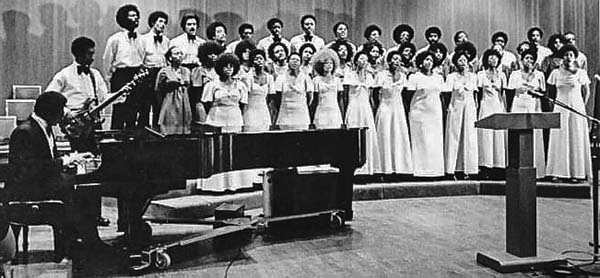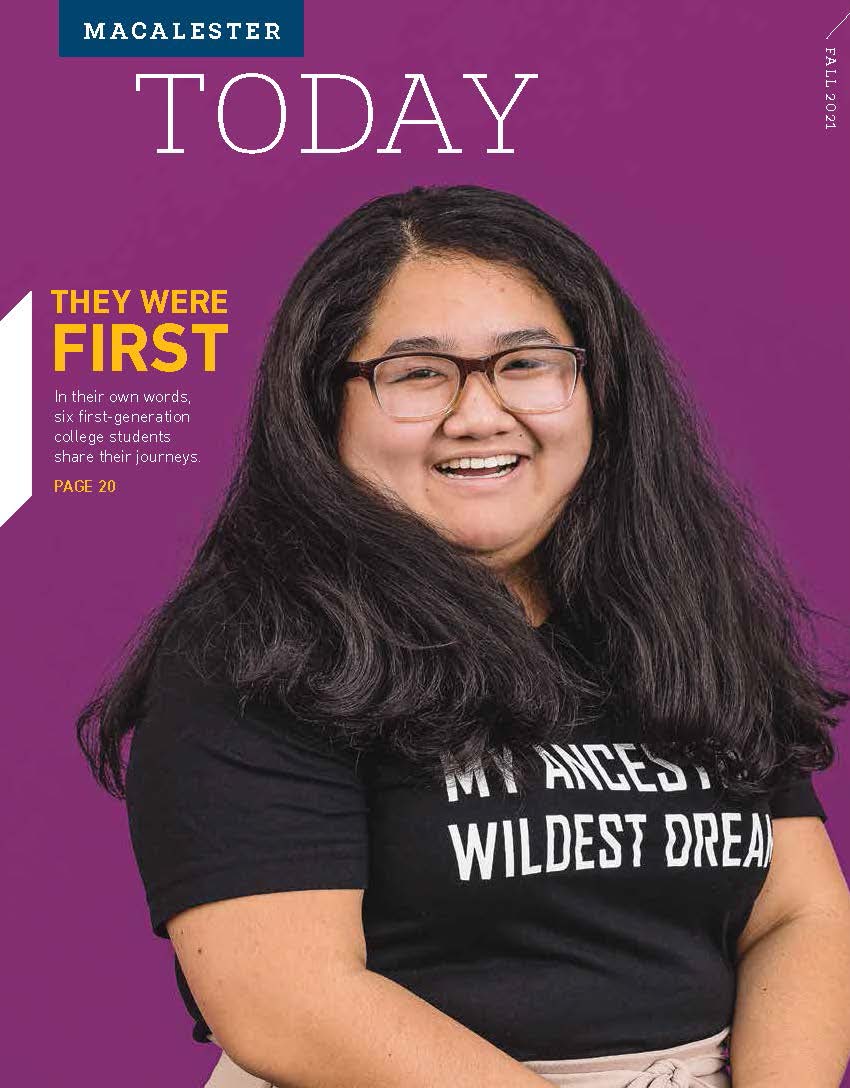
By Collier Meyerson ’07 / Photo by Theresa Scarbrough
Tuesday nights are typically rehearsal nights at the Sabathani Community Center in south Minneapolis for the 30-piece ensemble called Sounds of Blackness. But in 2020, on the last Tuesday in May, the group didn’t convene as usual. Instead, they joined hundreds of others in the streets, just five blocks from their meeting place, to protest the killing of George Floyd. “We live and work in the community,” says the ensemble’s leader, Gary Hines ’74, of the group’s presence in the historically Black neighborhood. “We were, and still are, in and of the community.”
“How many fearful moments Sounds of Blackness got me through. . . . I wouldn’t be Michonne in The Walking Dead without ‘Optimistic’ by Sounds of Blackness, emboldening me as I went through that final audition. I wouldn’t be killing no Zombies! Have a song y’all, have a song. I now know that music is a part of my armor; it transforms the atmosphere, and sometimes that is all we can control.” –Danai Gurira ’01, at Macalester’s Commencement in 2016
For fifty years, Hines has been leading the ensemble—through three Grammy Awards, eleven albums, and performances on five continents—from south Minneapolis. But Sounds of Blackness, and Hines, got their start right across the river in the dorms of Macalester College.
The year was 1971. The Black Panthers were a household name, “Mercy Mercy Me” by Marvin Gaye peaked at #34 on the Billboard charts, and the Congressional Black Caucus had just been established. Russell Knighton ’72, who founded Macalester College Black Voices in 1969, would soon be graduating from Macalester and needed someone to pass his baton on to.
That person was Gary Hines.
Hines moved to Minneapolis from New York as a 12-year-old after his mother—Doris Hines, “a world-renowned jazz singer”—fell in love with the Twin Cities while visiting for a performance. Arriving in Minneapolis was a culture shock for the young Hines. “Everyone was blond,” he recounts through chuckles. But even then, he adds, the cities’ Black music scene was influential. “Numerically the Black community was small, but it was always very active culturally,” he says. “Their R&B could rival Motown,” he notes, adding that Minneapolis “was the backdrop of the birth of a Prince, literally.”
Hines wasn’t planning to go to Macalester. He’d gotten into Dartmouth College, an Ivy League school back east a little closer to where he’d spent his early childhood in Yonkers, a working-class suburb of New York City. But Earl Bowman, his high school history teacher-turned-Macalester dean, led him to Grand Avenue. “[Dean Bowman] encouraged me to make the decision on my own but just his presence at Mac was enough to dissuade me from going to Dartmouth,” says Hines, who majored in sociology.
During his sophomore year Hines was approached by Knighton to take over the ensemble so it could live on, with a new name: Sounds of Blackness. “It was all about the movement at the time our repertoire was protest songs,” Hines says of the ensemble’s role in the fight for racial justice and equality. But God, he says, gave him the vision to incorporate “every genre of Black music in the tradition of Duke Ellington—jazz, blues, spirituals, soul rock, gospel, reggae, ragtime: every sound of Blackness.” You’d often hear the group practicing in the Janet Wallace Fine Arts Center and around dorm pianos.
“The Sounds of Blackness really was my introduction to Black music in the church,” says Valeria Phillips ’74. “Gary had a way of drawing people in and his manner of teaching was really good. He would rehearse until we got it right. He had wonderful harmonies and rhythms,” which Hines attributes to growing up in the church and hearing his mother sing.
But singing and performing was only one part of the group. To Black Macalester students at the time, Sounds of Blackness represented something different entirely. “The Sounds of Blackness was a respite and haven—not just to sing but also the teachings Gary included with the music,” says Phillips. “We got a lot of history with the songs we sang that Gary did wonderful arrangements of, as well as original songs he wrote that were really beautiful. It was a real community.”
Phillips remembers the group performing off campus in Minneapolis at Sabathani, the church where Hines grew up. “Gary’s mother sang at one of our concerts—I remember her coming from the back of that church singing the Lord’s Prayer and it was one of the most beautiful things you ever heard,” she says. “It was a really wonderful environment, treasuring our history and bringing it forth in our song.”
In 1969, Macalester had launched an experimental and ambitious program called Expanded Educational Opportunities (EEO) at the urging of a group of Black students. That year, 75 mostly Black students from working class and low-income backgrounds entered the overwhelmingly white campus, changing the college overnight. The program, progressive at its heart, intended to address the enormous racial disparity at the college. Born out of the initiative was Macalester’s African American studies program, an office of minority programs, and increasing faculty of color.
For some of Macalester’s new Black students, far from their families and culture, and feeling out of place in their new environment, the Sounds of Blackness was something of a clubhouse. “I had white roommates but there was something familial about the Sounds of Blackness that was very welcoming and nurturing,” says Phillips.
And Hines was, in many ways, the glue that kept the family together. Eventually, that family expanded beyond Grand and Snelling, adding students from Augsburg and Hamline. The group also began performing outside of the Twin Cities. “I remember taking a bus trip to Pueblo, Colorado,’’ says Phillips. Between bus rehearsals and sleep, Phillips remembers picking up a hitchhiker, common for the time: “At the time there was a dance out called ‘The Robot’ and we met this guy who was doing The Robot, and he traveled with us to the next city.”
Quickly going from campus choir to accomplished ensemble by 1974, the group traveled to San Francisco to perform at the National Urban League’s convention. “Meeting and doing the grand finale with the Pointer Sisters and Edwin Hawkins was at the top of my list,” Hines says of his Macalester memories.
But perhaps the most memorable moment of Sounds of Blackness under Gary Hines was during his graduation. Legendary Black American photographer Gordon Parks gave a Commencement speech at a special ceremony for Macalester graduates of color. After the event Hines approached Parks for some personal words of advice. “He said one of the keys to survival and making it in this world as a Black man was to ‘always say yes. They’re always going to question your credentials, but be prepared to answer yes. You have to be able to say yes to everything,’” he recalls Parks telling him.
And Gary Hines did say yes. Over the next four decades the Sounds of Blackness became an institution, in Minneapolis and beyond.
Back in 1975, at the encouragement of Macalester history professor Mahmoud El-Kati, Hines had filed for 501c3 status, institutionalizing the group by making it a nonprofit organization too. Today the ensemble is 30 people with a touring ensemble of 17, all the while keeping to its ethos as a space to harness community. “We kept a grassroots and hands-on approach with city residents in addition to performing worldwide,” he told me of the group, which includes maintaining a regular presence at neighborhood events. In addition to its Grammy Awards, the ensemble has also won four Stellar Awards and one NAACP Image Award, and was nominated for an Emmy in 1999.
While Sounds of Blackness has enjoyed notoriety and fame across the Twin Cities and worldwide, its connection to Macalester faded once the ensemble moved off campus. But in 2014, the connection was rekindled. Kyla Martin ’15, who was a senior at the time, had been researching Black history on campus as part of her work for the Department of Multicultural Life. After DML staff member Sedric McClure brought the ensemble’s history to her attention, Martin met with Hines, talked with Mac’s archivist, and spearheaded an initiative to rename the Turck residence hall’s first-floor lounge—where Sounds of Blackness had often practiced—in the ensemble’s honor. “Macalester has a lot of rich histories for many identity groups that I think isn’t out there for folks to know about,” says Martin, who led the renaming so that other students would know about this chapter in the school’s history.
“I thought [the renaming] was a great recognition for Gary and the work that he’d done,” says Phillips. “I think it’s an appropriate recognition because a lot of rehearsing went on there.”
Back in Minneapolis, Hines remains a stalwart of his community. In May, the group, under his direction, performed his 2020 song “Sick and Tired,” at an event marking the anniversary of George Floyd’s murder. (The title is a nod to voting rights activist Fannie Lou Hamer, who famously said “I’m sick and tired of being sick and tired” in a 1964 speech about American racism.) “That was a rallying point not only for the African American community, but people of all backgrounds, whether they’re red, brown, yellow, black, white, men, women, young, old,” he says.
On Juneteenth this year, Sounds of Blackness released its newest single, “Time for Reparations.” As musicians, Hines says, the group has always been the vanguard of Black movements for justice and equality. “Being directly involved in the movement and also providing an anthem for the movement is what our goal has been,” he told me.
And for Hines—who hopes to use the renewed relationship with Macalester to recruit students for the ensemble—the Turck lounge renaming was a coming home. Since then, he has performed on campus at Reunion and addressed the Class of 2016 at Commencement. “I would like to see us come full circle,” he says about bringing the group back to Macalester.
In their future, he hopes for the Sounds of Blackness to return to the Janet Wallace Fine Arts Center once again, this time with members who hail from his community, a way to bridge the gap between the ivory tower and south Minneapolis, which are mere miles away but sometimes worlds apart. And Macalester would be lucky to have Hines back, an intrepid doer with an incredible legacy, who seemed to have followed the wise words of Gordon Parks by saying “yes” at every turn.

Collier Meyerson ’07 is a writer living in New York City. She is a contributor at New York Magazine and a Knobler Fellow at Type Media Center.
November 17 2021
Back to top





